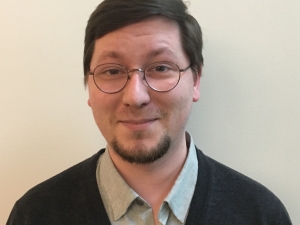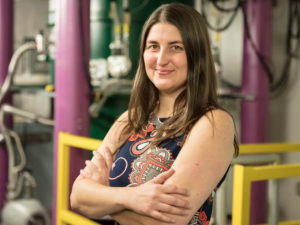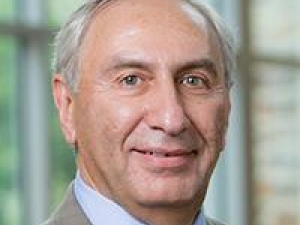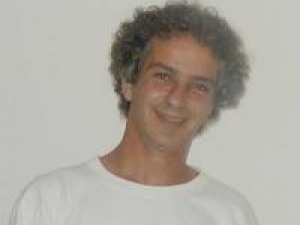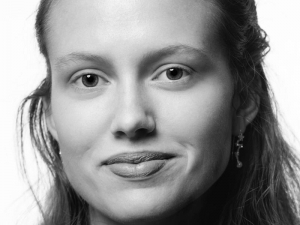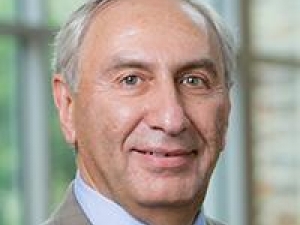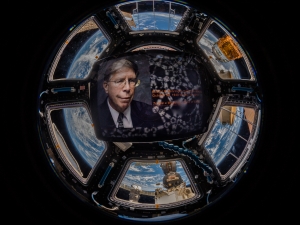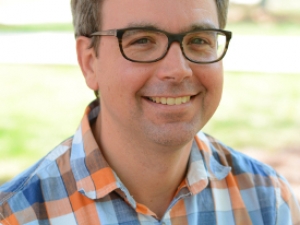“My business is understanding how the universe evolves, what it’s made of, and what its fate is going to be,” says Michael Troxel, assistant professor of physics at Duke beginning January 1, 2019. At the heart of these questions lie dark matter and dark energy. Although together they make up most of the universe, they are little understood. Current estimates of the composition of the universe put dark energy at about 70%, dark matter at 25%, and baryonic (or ordinary) matter at 5%. … read more about Michael Troxel: Using Weak Gravitational Lensing to Map the Invisible Universe »
At age 10, Dan Scolnic had his life all planned out: go to Duke, play basketball as a walk-on, then head to the NBA. These dreams were quashed when a pediatrician plotted Scolnic’s height on a growth chart and informed him he’d probably max out at 5’2”. “It was one of the worst days of my childhood,” Scolnic says. The growth chart turned out to be wrong--Scolnic is 5’11”--and he ended up going to MIT for his undergraduate education. But he is coming to Duke after all, as an assistant… read more about Dan Scolnic: Using Supernovae to Construct Expansion History of the Universe »
Duke University is pleased to announce the Du Châtelet Prize in Philosophy of Physics, an award that celebrates excellence in philosophy of physics and promotes breadth across the field both historically and philosophically. The prize — supported by Duke in collaboration with the Studies in History and Philosophy of Science — will be awarded next Spring to a U.S. or international graduate student or recent Ph.D. to recognize their previously unpublished work in philosophy of physics. The winner will receive $1,000… read more about Duke Announces New Prize for Philosophy of Physics »
Former graduate student Leah Broussard now works at Oak Ridge National Laboratory where she studies neutron decay. She was featured on ORNL's news site discussing her background and current work. Read "Leah Broussard: Breaking the Standard Model to Fix Understanding of the Universe" here. Photo Credit: Oak Ridge National Laboratory read more about Former Grad Student Broussard Studies Neutron Decay »
Incoming Cosmology Prof. Daniel Scolnic was interviewed about work on the Hubble constant tension. Read "Cosmology is in Crisis Over How to Measure the Universe" on WIRED here. read more about Incoming Prof. Scolnic Featured on WIRED »
Prof. Michael Rubinstein and collaborators have published research regarding adhesion and binding of mucus to develop therapies that could provide relief in patients with cystic fibrosis. Read more in ScienceDaily's article "Can scientists change mucus to make it easier to clear, limiting harm to lungs?" here. The paper "Roles of mucus adhesion and cohesion in cough clearance" can be found here. read more about Prof. Rubinstein and Collaborators Study Mucus to Help Patients with CF »
Prof. Ronen Plesser was interviewed by The Chronicle. Watch "Professor explains string theory and its history" here. read more about Prof. Plesser Explains String Theory »
Graduate student Adryanna Smith has been featured as one of the Faces of DUNE (Deep Underground Neutrino Group). Read how she discovered her love of physics on Fermilab's Twitter here and Facebook here. Smith is a second-year graduate student and a member of Prof. Kate Scholberg's group. read more about Grad Student Smith Featured on Faces of DUNE »
Prof. Michael Rubinstein is part of a team that just received a research grant from NSF to study changes in DNA that can cause cancer. Read more on The Chroncile's website here. read more about Prof. Rubinstein and Team Receive NSF Grant to Research Cancer »
On Sunday, October 7, 2018, the late Prof. Bob Behringer's picture was floated on the International Space Station. This dedication was announced in August. Professor for Physics of Granular Matter at the University of Cologne and member of the Institute of Materials Physics in Space Prof. Dr. Matthias Sperl said: "The picture was taken by ISS Comander Alexander Gerest in the module Cupola from where one can look down upon Earth. The picture makes sure we can embrace the… read more about Prof. Behringer's Image Floated on the International Space Station »
Prof. and Chair Warren Warren's former coworker Donna Strickland has won the 2018 Nobel Prize in Physics for her work creating tools from beams of light. She is the first female Physics Nobel Laureate in over half a century. Strickland worked with Warren at Princeton University in the early 1990s and is now on the faculty at the University of Waterloo in Ontario, Canada. Read more on The Guardian's website here. read more about Prof. Warren's Former Coworker Wins 2018 Nobel Prize in Physics »
The American Physical Society announced that Prof. Shailesh Chandrasekharan (nominated by the Division of Computational Physics), Prof. Ying Wu (nominated by the Division of Physics of Beams) and secondary faculty member Prof. Kenneth Brown (nominated by the Division of Quantum Information) have all been elected Fellows of the American Physical Society. The criterion for election is "exceptional contributions to the physics enterprise; e.g., outstanding physics research,… read more about Profs. Brown, Chandrasekharan, and Wu Elected APS Fellows »
Prof. Warren Warren received the 2018 William F. Meggers Award at the annual Optical Society (OSA) meeting in Washington, DC Dr. Warren's research interests and 300 publications reflect advances in fundamental physics and technology, with applications ranging from molecular spectroscopy to imaging in extremely complex systems (such as human tissue or a Renaissance painting). The Meggers Award recognizes his developments of coherent laser spectroscopy, including femtosecond laser pulse shaping and phase-… read more about Prof. Warren Received 2018 William F. Meggers Award »
Prof. Nicolas Brunel, with Ulises Pereira of the University of Chicago, has published new results about brain activity on bioRxiv. Read "Unsupervised learning of persistent and sequential activity" here. read more about Prof. Brunel Published New Results »
The Department of Physics at Duke University in Durham, North Carolina invites applications and nominations for a tenure-track position at the assistant professor level in the area of observational cosmology. The physics department is committed to building a faculty that is inclusive and is representative of our community and, for this reason, we strongly encourage applicants who come from groups that are historically underrepresented in physics departments. The successful candidate should demonstrate a strong… read more about Faculty Search: Assistant Professor in Observational Cosmology »
Prof. Roxanne Springer and colleagues have published an op-ed on The Back Page of APS News regarding the Feynman symposium at the April APS meeting and "APS in the #MeToo Era". Read it here. read more about Prof. Springer Published Op-Ed on APS in the #MeToo Era »
Graduate student Baran Bodur, of the Duke Neutrino and Cosmology Group, participated in the upgrade of the Super-Kamiokande underground neutrino detector during the summer of 2018. Super-K is being drained and refurbished for a next phase called “SK-Gd” with addition of gadolinium. Bodur helped with renewal of the outer detector’s lining and light sensors. read more about Grad Student Bodur Assisted with Super-K Upgrade »
Prof. Kenneth Brown (ECE, secondary Physics) is the leader of a collaboration of seven universities planning to build the world's first practical quantum computer in the next five years. Read more in Pratt's story "Duke to Lead $15 Million Program to Create First Practical Quantum Computer" here and stay tuned for more exciting updates. read more about Prof. Brown Leading Team to Build First Practical Quantum Computer »
One year ago the Dark Energy Survey (DES) released the initial cosmological results from its first year of data using a combined analysis of weak gravitational lensing and the clustering of large-scale structure in the Universe. New Duke Physics Prof. Michael Troxel (incoming January 1, 2019) lead the weak lensing analysis that went into these combined constraints, which have now been published in Physical Review D and are featured in an APS 'Viewpoint' article "Weak Lensing Becomes a High-… read more about Incoming Prof. Troxel Published in Physics Review D and Featured in APS Viewpoint »
Ultimately, all matter is governed by the laws of quantum mechanics. Intriguing quantum physics is leveraged in various technical applications like high-temperature superconductivity and it fuels high hopes for a revolution in information technology through quantum computation. As it turns out, there are fundamental limitations for our options to probe quantum systems. While the complexity of a quantum system increases quickly when considering larger and larger system sizes, we usually just… read more about Large quantum systems are masters at hiding their qualities. »
This summer Prof. Mark Kruse’s high school One Tree Hill College in Auckland, New Zealand presented him with an alumni award and students performed the haka. There are many variants of the haka and it is historically a Maori war dance but also performed to show great honor and respect. You can watch the award presentation and haka here. read more about Prof. Kruse Honored with Alumni Award and Haka »
Prof. Mark Kruse was interviewed by New Zealand's TVNZ 1's show Breakfast discussing the Large Hadron Collider. Watch it here. read more about Prof. Kruse Interviewed by New Zealand News Show »
The Physics Department will host a free open house to view the Persied meteor shower from the Duke Teaching Observatory in Duke Forest on Monday, August 13 at 8:30pm. WRAL News has publicized the event details in a story about local gatherings for this astronomy event on their WeatherCenter blog. Read it here. Check out the Duke Teaching Observatory's webpage for more open house events this year. read more about Duke Teaching Observatory to Host Perseid Meteor Shower Event »
Prof. Dr. Matthias Sperl, professor for Physics of Granular Matter at the University of Cologne and member of the Institute of Materials Physics in Space shared the following exciting news: With the enclosed picture floating next to the instrument Soft-Matter Dynamics on the International Space Station, there will be a dedication of it to Prof. Bob Behringer's memory. The instrument was sent up by SpaceX-15 on June 29, installed by German ESA astronaut Alexander Gerst on… read more about Soft-Matter Dynamics Instrument on ISS to be Dedicated in Prof. Bob Behringer's Memory »
The Triangle Universities Nuclear Lab (TUNL) has been featured in The Chronicle's series Flashback in an article, out today, called "Flashback: Building Duke's nuclear lab". Read it on The Chronicle's website here. read more about TUNL Featured by The Chronicle in Flashback Series »
With deepest regrets we report that Robert P. Behringer, James B. Duke Professor, passed away on July 10, 2018. Bob received both his B.S. (1970) and PhD (1975) from Duke Physics, served as department chair from 1999-2002, lead the successful Behringer Group researching aspects of granular and fluid flows, received countless awards, and was beloved by all who knew him. DukeToday commemorated Bob with a lowering of flags and obituary online here. The News… read more about The Passing of Prof. Robert P. Behringer (1948-2018) »
Graduate student Erin Conley was included as one the Faces of DUNE (Deep Underground Neutrino Experiment). She described her first DUNE presentation experience and you can read it on Fermilab's Twitter here and Facebook here. Conley is a member of Prof. Kate Scholberg's group. She became a New Young DUNE Representative last March and is researching supernova neutrinos. read more about Grad Student Conley is one of the Faces of DUNE »
It is with sadness that we report that Prof. Emeritus Richard Walter has passed away. His obituary can be found on Hall-Wynne's website here. Prof. Walter's life will be honored with a Catholic mass on Monday, July 2 at 11:30 a.m. at Few Chapel, 2600 Croasdaile Village Parkway. Family will receive friends beforehand at the chapel beginning at 10:30. Private burial to follow at St. Matthew Catholic Cemetery. In lieu of flowers, memorial contributions may be made to Duke Homecare and… read more about The Passing of Prof. Emeritus Richard Walter »
Congratulations to Prof. Anselm Vossen, who received the Department of Energy's Early Career Award. Read the press release on Duke Today here and find more information on the award here. 6/28/18 update: NewsWise prepared a nice article "Gaining New Insights Into Proton Structure" that can be found here. read more about Prof. Vossen Awarded DOE's Early Career Award »
Graduate student Connor Awe was awarded Best National Laboratory Collaboration by the NNSA for his work at Oak Ridge National Laboratory last summer. Awe’s research focused on searches for coherent elastic neutrino-nucleus scattering (CEvNS) and evaluation of new neutrino detector designs as part of the COHERENT collaboration. Fellow graduate student Jay Runge accepted the award on Awe’s behalf at the University Program Review while he was away presenting a poster at Neutrino 2018. Awe’s… read more about Graduate Student Awe Recipient of NNSA's Best National Laboratory Collaboration »

